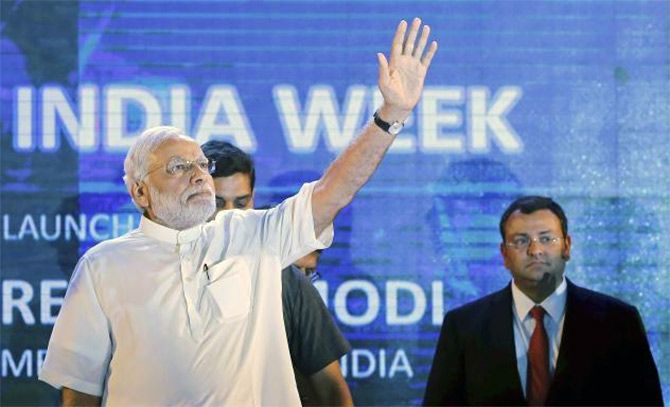The anti-Digital India campaign is a vindictive hatchet job rather than a fact-based, rationally sound appraisal; a personal attack rather than issue-based criticism; an ideological assault rather than altruistic effort. It must be called out for what it is, says Vivek Gumaste.

It was a momentary lull, a deceptive pause, a strategic retreat forced upon them willy-nilly by the overwhelming democratic mandate conferred on Prime Minister Narendra Modi by the citizens of India and his categorical exoneration by a Supreme Court-vetted Special Investigations Team.
A year later, however, they are back at it again; the vicious, biased and singularly parochial witch-hunt orchestrated by the Modi antagonists has resumed with renewed vitriol replete with its usual dose of hyperbole, half-truths and blatant lies: the latest salvo being a toxic negativistic petition signed by 137 US based academics that aims to derail Modi's efforts to co-opt Silicon Valley into the 'Digital India' initiative.
Is there any palpable merit to this ostensibly disruptive petition? Are the objections factually robust, logically sound and directly relevant? And is this an authentic exercise to safeguard the interests of the nation? The answer is a resounding no.
To comprehend the magnitude and deviation of this depravity we need first understand the concept of 'Digital India'. Digital India is a flagship programme of the government that seeks to transform the entire ecosystem of public services through the use of information technology with the express purpose of turning India into a digitally empowered society and knowledge economy.
Decidedly, Digital India is a secular initiative with no hidden motive; the sole objective being to resolve people issues and advance the nation. Yet, these worthy signatories see in this strictly developmental module a plenitude of non-existent demons; a medley of fearsome hallucinations that are divorced from ground reality and a 'near certainty that such digital systems will be used to enhance surveillance and repress the Constitutionally-protected rights of citizens.'
Why this is a 'near certainty' the petitioners fail to explain apart from making oblique references to cliched defunct allegations about the Gujarat riots and wild one-sided allegations of interference in Indian academia.
Professor Richard Falk, professor emeritus of law at Princeton University and a signatory to the petition, goes one step further claiming in an interview (Outlook, September 18) that the Modi administration 'can abuse digitalisation to target members of minority communities or those who are critical of its policies.'
He too offers no plausible explanation but inadvertently incriminates himself and his tribe when he concludes that 'it is impossible to disentangle the Modi government or Modi as a political personality from the Digital India campaign.' So this debate is not about Digital India at all, but about Modi; an underhand attempt by Modi's detractors to settle personal scores at the cost of the nation's development; petty vindictiveness at its worst that clings stubbornly to outdated and demolished presuppositions. This is unacceptable.
Concerns about Modi's record may have had some validity 13 years ago in the immediate aftermath of the Gujarat riots. But after an extensive investigation conducted under the aegis of an impeccable democratic institution, the Supreme Court which found no wrongdoing on Modi's part, such misgivings are redundant.
Persistence with this stance is an expression of deep-set prejudice and unadulterated bigotry and a pernicious attempt to interject communalism into a mainstream initiative. Moreover, nothing that the current government has done so far lends credence to the charge of religious partisanship.
What makes this campaign even more despicable and repulsive is that it makes common cause with Pakistani-origin academics to undermine India as Aseem Shukla points out in his article The Illiberal Indian Left: An Anatomy Of The Petition (external link). The competency of a Shahzad Bashir and Tayyab Mahmud, or Junaid Rana in their respective fields is not in question, but 'did signatories wonder as to the optics of Indian origin academics joining with Pakistanis to demand that American businesses reconsider investment in India?'
For long, the anti-nationalist, anti-Modi expatriate lobby has had a free run of the American academic terrain: Obfuscating facts, distorting incidents and indulging in an unbridled dissemination of calumny. However, for the first time these shenanigans have triggered a strident backlash in the form of a counter-petition (external link) that has so far garnered close to 1,500 signatures -- nearly 10 times that of the anti-Modi petition.
Without resorting to ranting and raving, this counter-petition makes a point-by-point rebuttal to the unsubstantiated accusations levelled in the original petition. Other commentators like Madhu Kishawar have also posted (external link) sane and logical rejoinders.
But what do you do when your trumped-up allegations are factually demolished and your rationale is shown up to be hollow? You start whining like a puppy, disregard the dignified and appropriate responses to your viewpoint and shift the spotlight onto isolated instances of extreme behaviour accusing your adversaries of uncouth behaviour, intemperate language and even physical intimidation.
Suvir Kaul, the A M Rosenthal professor of English, University of Pennsylvania and one of the petitioners writes: 'Our letter stated a particular point of view that could and should have been debated.' (Digital (Hindu) India, Outlook, September 18).
Yes, Kaul, the issue has been debated and effectively if you care to look beyond the arrogance of your own stance.
He goes on to aver: 'Instead of debate, what we have been subject to is a barrage of personal insults, and worse, threats. Withdraw your signatures, we were told, or else: "Failure to do this now will result in you repenting with untold suffering on your deathbed".'
Another wrote: 'You will suffer the consequences of your folly... You have exposed yourself to the wrath of a large number of people who actively support Modi and his government. You have my condolences for signing that petition.'
To ascertain the validity of these charges of harassment and intimidation, I scrolled through the 427 comments (as of September 19) posted in response to the 'Faculty Statement on Narendra Modi Visit to Silicon Valley' on the Web site (external link) The Academe Blog. The majority of them were civil and made attempts to address the issue factually and logically. The language varied with some being more vociferous than others but none appeared to cross the line.
I am not suggesting that the examples quoted by Kaul are fictitious and I am not denying that some emotionally excitable radicals do indulge in outright hate rants. But this is a minuscule minority and not the majority; they are the exceptions, not the rule.
This peeve of Kaul brings to the fore a well-known modus operandi of the anti-nationalist cabal: When your out debated, pick up one isolated outrageous remark, blow it out of proportion and project it as the stereotype to malign an entire viewpoint and thus effectively hijack the debate.
In summary, the anti-Digital India campaign is a vindictive hatchet job rather than a fact-based, rationally sound appraisal; a personal attack rather than issue-based criticism; an ideological assault rather than altruistic effort. It is in effect an argumentum ad hominem. It must be called out for what it is.
The counter-petition calls upon the signatories of the original petition 'to introspect, change, and for once seek to earn the trust and respect of the community in whose name they have been making a living all these years.' It is high time the expatriate anti-nationalist lobby heeds this advice.
IMAGE: Prime Minister Narendra Modi at the launch of the Digital India Week in New Delhi. Photograph: Adnan Abidi/Reuters











 © 2025
© 2025